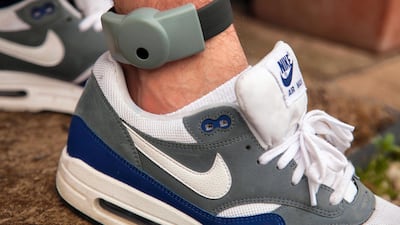Electronic tags for criminals are to be introduced in the UAE, offering an alternative to jail for those who commit minor offences.
People found guilty of crimes carrying a sentence of less than two years and do not include mandatory deportation, such as theft and writing dishonoured cheques, could be put under house arrest instead of doing time behind bars.
The monitoring devices, also called GPS bracelets, track the location of the person wearing it.
The tag, which will be introduced after a federal law was issued in September, can be used for suspects on trial, those on bail and for house arrest.
Anyone convicted of the same crime twice will not be eligible and those linked to serious crimes, such as sexual and drug offences, will also not be included in the tagging scheme.
Prosecutors will be given the authority to replace police custody with house arrest.
Electronic tagging could also be used to reduce fines against defendants.
“If a suspect was found guilty and sentenced only to pay a fine, Dh100 should be reduced from the amount of the fine for each day spent wearing the GPS bracelet,” legal consultant Hassan Elhais, of Al Rowaad Advocates, said.
If the tag causes any health problems, the wearer can apply for it to be removed by lodging an official medical report to back up the complaint. If successful, the person will be returned to police custody.
Mr Elhais said that the law gave judges the freedom to decide when the tag should be used on a case-by-case basis.
It also grants convicts under house arrest the right to request to leave the country for some time, if they give their destination, reasons for travel and return date. If granted, time spent outside the country would not be taken off the suspect’s sentence.
_______________
Read more:
FNC approves court video link law
Live video link to be introduced in Abu Dhabi courts
UAE Public Prosecution to use Artificial Intelligence in judicial system
______________
Prisoners jailed for between two and five years, who have already served half of their sentence, will also be given the opportunity to apply to serve the rest of their term under house arrest.
“The request should be filed to prosecutors who will determine the convict’s behaviour during imprisonment and if they pose a risk to community members or national security before filing a report to court,” Mr Elhais said.
If the request is rejected, the prisoner can apply again after six months.
Police will regularly visit the prisoner’s home to check the device and submit reports.
Detainees are also required to keep police aware if they want to move house or work.
“Some people who undergo investigation for a crime, but then are excluded after evidence shows that they were not involved, will certainly praise this practice,” Mr Elhais said.
He said the law would give a boost to members of the prisoners’ immediate families, who may be affected by their imprisonment.
“UAE laws are designed to punish the person who commits the crime and not those who surround him, like his family, and the GPS bracelet further boosts this principle,” Mr Elhais said.
It is not yet known when exactly the bracelets will be introduced.
The UAE is increasingly turning to technology to dispense justice. Just last week, Public Prosecution announced it was exploring ways to introduce artificial intelligence into legal proceedings.
In September, it was revealed that courts in Abu Dhabi are to allow trials to take place with the use of video conferencing in cases where it is inconvenient to bring defendants from prison.
Abu Dhabi Judicial Department said the move would speed up the judicial process.
Tagging already in use across the world
Electronic monitoring is used in a number of countries.
The system is widely used in England to monitor curfews and conditions of a court or prison order through a tag, usually attached to the ankle, which sends location data to a base unit in a place stated in the convict’s court or prison order.
In Italy, house arrest is commonly imposed on felons who are close to the end of their prison terms, or those whose health prevents them from being housed in a prison.
New Zealand uses it extensively to ensure that convicted offenders subject to home detention remain within approved areas.


